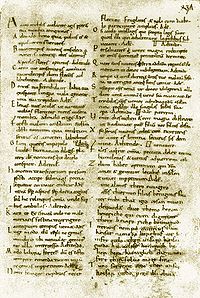
Photo from wikipedia
Purpose This research aims to compare the contributions of two authors and practitioners from the 1920s whose work was to a certain extent at odds with the dominant scientific management… Click to show full abstract
Purpose This research aims to compare the contributions of two authors and practitioners from the 1920s whose work was to a certain extent at odds with the dominant scientific management approach of the period. Design/methodology/approach In this article, we carry out a comparative textual analysis of texts written by Sheldon and Follett in the 1920s. This technique consists of a hierarchical descendant classification, which we use to uncover the thematic universes that Sheldon and Follett create in characterizing the fundamentals of management activity. Findings This comparative textual analysis demonstrates that Follett and Sheldon developed two different ways of relying on a singular fundamental principle of management: integration. Originality/value A comparative analysis of Follett and Sheldon’s work has never been attempted. While textual analysis has been used in management research, to our knowledge, such analyses are rare in research seeking to understand management history.
Journal Title: Journal of Management History
Year Published: 2017
Link to full text (if available)
Share on Social Media: Sign Up to like & get
recommendations!